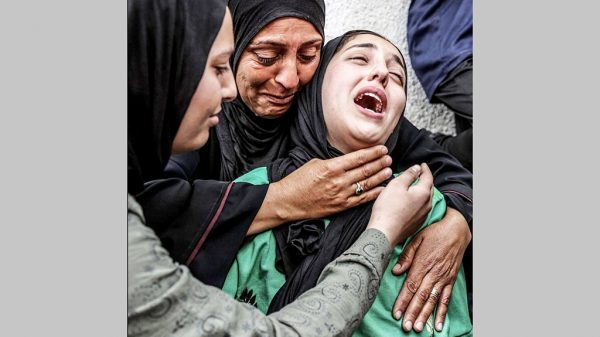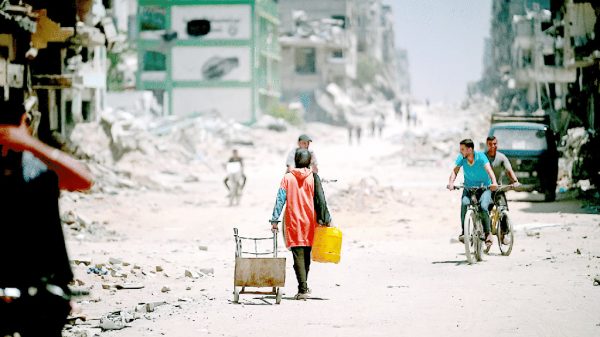Rise of Communalism: Bangladesh at a Crossroads

Farzana Mahmood :
The rumour of desecrating the holy Qur’an at a Hindu temple in Cumilla and the incidents of vandalism in Hindu houses and temples following that rumour certainly have dismayed the secular citizens of Bangladesh. Spreading rumour of desecrating holy Qur’an and defaming Islam by the religious minorities have been used as a tactic prior the communal attacks in Ramu and Nasirnagar. The repeated happenings of similar incidents manifest the growth of communalism in the society. The alarming rise of communalism among a section of people is also evident when we evaluate social media posts pertaining to these heinous crimes. One may ponder why the same tactic of communal instigation has been used by the offenders? The answer is implicit in the fact that religion is a sensitive issue in the society of Bangladesh and it is also a tool of political gain.
Since the people of Bangladesh experienced the bitterness of communalism and oppression under the name of religion prior the partition of 1947, during the time of Pakistani rule and in the Liberation War of 1971, they remained united against communalism after the independence of the country. A secular Bengali nationalism, which emerged to combat the religious nationalism of Pakistan, remained the basis for the incorporation of secularism in the Constitution of Bangladesh. Though Bangladesh was created with secular ethos the undemocratic rulers, after the brutal killing of the Father of the Nation Bangabandhu Sheikh Mujibur Rahman in 1975, promoted communal forces at the cost of secularism to gain political legitimacy. General Ziaur Rahman amended the Constitution, which included elimination of secularism and Bengali nationalism. Vide another Amendment (8th) the next ruler General Hussain Muhammad Ershad declared Islam as the state religion. Both the undemocratic rulers promoted religious nationalism, changed the legal discourse and socio-political structure and facilitated communal political parties to establish their hegemony. Consequently fundamentalism, communalism and persecution against religious minorities increased. This trend continued even after the restoration of democracy in the 1990’s.
Bangladesh, being a country with nearly 90 percent Muslim population, is influenced by the global resurgence of fundamentalist trends. Dominant literature reveals that the Iranian Revolution, the demolition of Babri Mosque in India, terrorist attack in the USA, anti-Western trend in the Middle East, rise of extremism and Islamic militants in Pakistan and Afghanistan, growth of religious nationalism in India and oppression against Rohingya Muslims in Myanmar inflamed communal politics, communalism and communal violence in Bangladesh. Rise of religious nationalism in the neighbouring countries motivate the communal parties and forces to demand a society where religious minorities would be treated as second class citizens. The global influence of religious extremism, stand against the pro-Western anti-Islamic forces and persecutions of Muslims in many countries have motivated a section of people to relate themselves with the communal forces. Critics argue that with the rise of militant Islam, it is important to realise the issue of the sentiment of the Muslims of Bangladesh about oppression of the Muslims around the world and their view towards the non-Muslims.
Moreover, misinterpretation of religious edicts contributes to communalism and prejudice against other faiths. The vested interest groups and communal forces tend to distinguish many acts as Haram or Halal, identify people as atheists, infidels and enemy of Islam without even explaining religious grounds. Critiques argue that through the redefinition of religious practices in every act of daily life, these forces intend to establish a religious trend which only suits their purpose. One can find many contents in social media which demonstrate a slow movement to filter Islam and redefine Islamic values and practices according to that trend. According to one school of thought the ultimate goal of this kind of movement is to systematically constrict Bengali secular culture and make Bangladesh a breeding ground of religious fundamentalists.
To fulfil their agenda the communal forces also interrupt secular cultural practices and aspire to make the education system retrogressive. Through violent attack in the Jatra Pala or in the Bengali New Year celebration they demonstrate that they will not let any progressive cultural system to flourish in the country. They try to adulterate the traditional Bengali culture and desire to mould a new kind of rigid culture in the society following the cultural practices of Pakistan and Afghanistan. They abuse and attack the progressive social forces who advocate non-communalism and secularism. Apart from physical abuse, cyber bullying and threats are used as a ploy to create an ambience of fear and to reduce free public space.
Communalism inflames minority oppression and it is often associated with communal violence. It is a threat to democracy, freedom of expression, religious liberty and religious minority rights. But unfortunately, no law of our country defines communalism and it is argued that without a definition of communalism emphasizing religion, Article 12 seems ineffective under the heading of secularism. It is also desirable that use of communal rhetoric be prohibited as an exception to freedom of speech and expression as guaranteed in the Constitution. Resistance should be created against those political parties, religious groups and forces that practise and propagate communal ideology, divide citizens on the ground of religion or discriminate amongst citizens for their religious identity. On the contrary, support should be extended to those political parties and groups who advocate and practise secularism and non-communalism.
To fight against communalism, emphasis should be given on the development of secular culture and education system. Any topic that influences communalism, hatred or division among citizens on the ground of religious identity must be identified and removed from the syllabus. Values and ideology that encourage religious diversity, inclusion, respect for contrary belief and tolerance should be embedded in the entire education system. It is equally important that the civil society and political parties join hand to promote Bengali heritage and culture of pluralism through organized efforts. Societal prejudice about other faiths could be changed by eradicating fallacy against the religious minorities and exchanging interfaith dialogues. In a pluralistic society like Bangladesh, which is influenced by the ethos of various religions, it is important that the interpretation of religious texts is not left in the hands of any self-proclaimed religious leader or scholar. Above all we have to ensure that at home and in every action, we practise and preach non-communalism which is essential to create a secular next generation.
With the rise of communalism and religious extremism home and abroad, Bangladesh is standing at a critical juncture. Therefore, it is pertinent that the State, non-State actors and citizens of Bangladesh work together to eliminate communalism and create a safe place for the followers of all religions.
The writer is an Advocate, Supreme Court of Bangladesh




























Leave a Reply